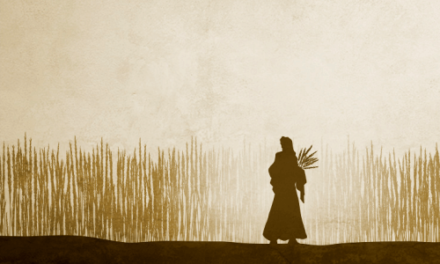Have you ever noticed that things get worse before they get better? Maybe you are trying to mend a broken relationship, or perhaps working on your personal development. But, whatever it is, you take that first step to trying to make things better, and they just get worse.
This post contains affiliate links, which means that for each purchase made I receive a small contribution at no extra cost to you. For more information please see my policies page.
Things Get Worse Before They Get Better
In today’s reflection, from the Bible passages for week 2 of the Scripture Plan Redeemed: 30 Days with the Israelite Slaves, which covers Exodus 5-12, the Israelites are attempting to leave Egypt. We begin with Moses and Aaron’s first meeting with Pharaoh to ask for God’s people to be let go, and end with the people being driven out of Egypt at the Passover. But, in the middle things seem to go from bad to worse.
You can download the free Scripture Plan using the sign up form below. The plan is undated, so you can start at any time!
Things will get worse before they get better
Let’s look at the stories in Exodus 5-12 to see what we can learn about why things get worse before they get better, and what we should do about it.
we face tougher opposition
Standing up to someone who is bullying or oppressing us takes a lot of courage! It can be scary to face someone who has power over you (real or imagined). But the thought that facing our aggressor will make things worse is also a difficult hurdle to cross. Things will probably get worse if we take a stand, but it is important to take this step.
In Exodus 5, when Moses and Aaron first speak to Pharaoh he is not impressed! He punishes the slaves by making their difficult tasks even harder. Now, when they make bricks they have to collect the straw first. It is impossible to make the same number of bricks in the same time, so the Israelites were beaten by their overseers.
We might also face opposition from those we are trying to help. When things got worse for the Israelites they complained to Moses and Aaron and blamed them.
“May the Lord take note of you and judge,” they said to them, “because you have made us reek to Pharaoh and his officials – putting a sword in their hand to kill us!” Exodus 5:21
We may also face spiritual opposition. In our difficult situation that we are trying to change we may not be facing a human enemy, but we are facing a spiritual one. If we are trying to make a change to improve our life or develop our character we might notice that things seem to get worse before they get better. New obstacles seem to appear before us or we may get discouraged by our lack of progress. We must recognise these as spiritual attacks trying to block our path.
So what should we do when things get worse before they get better?
- Don’t give up or take a step back into your difficult situation (like the Israelites did, pleading with Pharaoh and wanting to return to how things were)
- Don’t grumble amongst yourselves, blaming others (like they did to Moses and Aaron).
- Instead, lean into God and he will reassure you, like He did for Moses.
“Therefore, tell the Israelites: I am the Lord, and I will bring you out from the forced labor of the Egyptians and rescue you from slavery to them. I will redeem you with an outstretched arm and great acts of judgement. I will take you as my people, and I will be your God.” Exodus 6:6
It takes time
Scripture does not tell us how long the period of the plagues lasted for, but it was probably a few months. Often our struggles, or our journey towards a better life, takes even longer.
In Psalm 13 David cries out to God about the length of time he has been suffering.
How long, Lord? Will you forget me forever? How long will you hide your face from me? How long will I store up anxious concerns within me, agony in my mind every day? How long will my enemy dominate me? Psalm 13:1-2
So, why does it often take so long? The story of the plagues gives us a few answers.
- We need time. God might need to work in us so we are prepared for what is ahead. Alternatively, God might need to work in the lives of those who are causing our distress. In Exodus 10:3 God asks Pharaoh “How long will you refuse to humble yourself before me?”
- The end result will be better. By the end of the plagues the Egyptians were happy to see the Israelites leave. They did not just ‘let them go’ but drove them out, and gave them silver and gold to take with them. Maybe the time you spend waiting for things to get better will be of benefit to you too.
- So we will know that God is God. In Exodus 10:2 God explains to Moses that he has performed these miraculous signs (the plagues) so that they will know that he is the Lord. He is greater than any god the Egyptians might worship. We might need time to recognise that God is greater than anything else we are putting our trust in.
Point of crisis
As things move from bad to worse there is often a crisis point that ultimately changes the course of things for the better.
For the Egyptians and the Israelite slaves, this crisis point was the final plague: the death of the firstborn (Exodus 11:1-12:39). The Egyptians have finally had enough and drive the Israelites out of Egypt. The event is so significant to God that he tells the Israelites how they are to commemorate this event each year and they are even to change their calendar so that the year begins with this commemoration.
The events and commemorations of Passover are strongly connected with the death of Jesus. Jesus, the lamb of God, was crucified at Passover. (See 1 Cor 5:7; John 1:29; and John 19:14).
This event was a crisis point for Jesus’ followers. They thought things had got as bad as they possibly could – but the best was yet to come!
We might face a point of crisis in our situation or a spiritual crisis before we are able to break free from our difficult circumstances.
The long road to redemption
As we will see as we continue to study the lives of the Israelites in Exodus, their deliverance from the Egyptians is not the end of the journey. We too, still have a long way to go after the crisis is over before we truly ‘arrive’. But we can know that God will always be with us, teaching us what it means to be redeemed by God.
Get the Bible Study Guide and Workbook
If you have not already purchased your copy of the Bible Study Guide and Workbook to go with the Redeemed: 30 Days with the Israelite Slaves Scripture Plan it’s not too late! The workbook is undated and can be started at any time. Here you will find a page for each day of the study. The daily worksheets use my 5L Bible Study Method: Letter, Look, Learn, Live, Love which encourages and guides us to look deeper into the text we are reading.
You can also find the other posts about this Scripture Plan here:
Introduction: Redemption Bible Study
Week 1: The Redemption of Moses
Week 2: Things get worse before they get better
Week 3: 5 Things that happen after God sets us free
Week 4: How to follow God – lessons from Moses












This is a great article, thank you for sharing!!
Thanks, Amy!